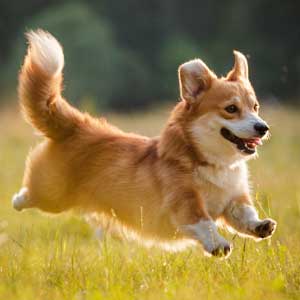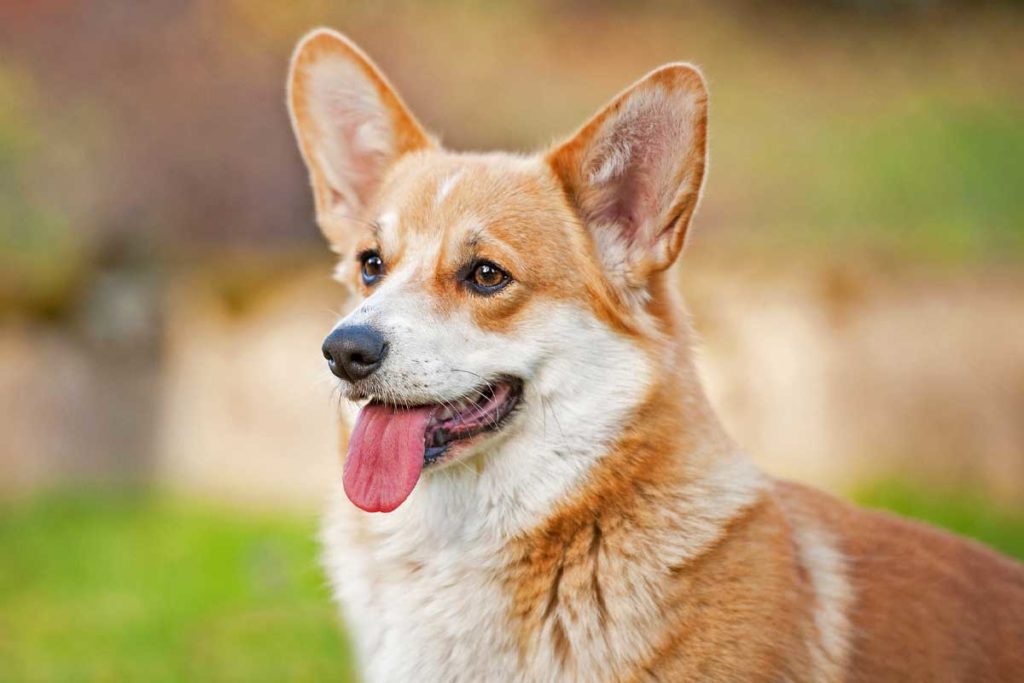The Pembroke Welsh corgi is a sturdy, medium-sized dwarf breed traditionally bred for herding. They have short legs, large erect ears, and stubby tail. Pembrokes also have a reputation for being wonderful companions with easy temperaments and spunky personalities. Famous for their English royalty ties, these dogs are growing in popularity across the globe.
Table of Contents
History
One of the world’s most popular herding dogs, the Pembroke Welsh corgi is an all-purpose farm dog. The American Kennel Club (AKC) notes that through the nineteenth century, these pups were considered invaluable to farmers in Wales, where they herded cattle, guarded livestock, provided rodent control, and protected their human family.
The Pembroke Welsh corgi owes a lot of its fame and popularity to English breeders and the breed’s royal status. Queen Elizabeth II has been an avid corgi owner for most of her life. Her parents gave her and her sister, Margaret, their first pups, Dookie and Jane, in 1933. There have been over 30 Pembroke Welsh corgis to live at Buckingham Palace. Many of the royal dogs have been descendants of the queen’s first pup of her own, Susan.
Pembroke and Cardigan Welsh corgis are often confused. However, they are two separate breeds since the late 1800s, notes AKC. Pembrokes have slightly smaller builds and pointier ears than their Cardigan counterparts. They also have either docked or naturally short, stubby tails, as opposed to the full, long tails of Cardigans.
Size
Adult Pembroke Welsh corgis typically stand between 10 and 12 inches tall at their shoulder. According to AKC, they usually weigh between 27 and 30 pounds. Naturally built long and low, these pups present a big dog in a small package.
Appearance
As an achondroplastic breed, Pembroke Welsh corgis have short legs and long bodies. In fact, they are the shortest breed of the herding dog group! Their short but powerful legs, muscular thighs, and a deep chest make them perfect herders.
Pembroke Welsh corgis come in a variety of assorted colors and combinations. Coat colors include red, sable, fawn, and black and tan, without or without white markings. Pembrokes typically have smooth double coats. Occasionally, a “fluffy” puppy will appear in a litter, with a longer, softer, fluffier coat.
Docked tails
Some kennel clubs, including AKC, dictate that the breed standard for Pembroke Welsh corgis includes a docked tail. Traditionally, a tail may have gotten in the way for corgis working on a farm herding large livestock. Some puppies are born with natural bobtails due to breeding. Most, however, have their tails closely docked manually within the first few days of life for cosmetic and breed standard reasons.
Both the American Veterinary Medical Association and American Animal Hospital Association formally oppose tail docking. According to their official statements, docking provides no benefits to dogs and puts them at risk of blood loss and infection. There are also other negative side effects associated with anesthesia. Many countries, including the United Kingdom, Australia, and others, have also moved to legally ban tail docking.
Grooming
Pembroke Welsh corgis have a thick, waterproof double coat. They have a soft, light undercoat covered by a coarse, medium-length outercoat. Corgis shed a significant amount daily. They shed even more during the spring and autumn when the seasons and weather change. With this, these dogs must be brushed regularly to remove shed hair before it gets all over the house.
Activity

These pups are strong, athletic little dogs originally developed to herd cattle and other livestock. Corgis work and have a moderate amount of energy. Daily exercise of at least one hour a day is important to keep them physically and mentally stimulated and healthy. Pembroke Welsh corgis are also surprisingly quick and agile and excel at agility and athletic activities. As working dogs, corgis love a job and can get bored and destructive otherwise. Some corgi owners channel this enthusiasm into herding, obedience, agility, and fetch training.
Health
Pembroke Welsh corgis are typically healthy dogs with few major health concerns. An average, healthy pup can live between 12 and 13 years.
Pembroke Welsh corgis can have hereditary eye disorders like progressive retinal atrophy. Corgi parents should be aware of an increased risk of degenerative myelopathy. This condition causes muscle atrophy, posture issues, partial or full limb paralysis, and decreased muscle mass. Von Willebrand’s disease, a bleeding disorder, is also more common in corgis than other breeds.
AKC also advises that Pembroke Welsh corgis’ ears should be cleaned and checked weekly for signs of infection. As with all dogs, teeth brushing is important to maintaining oral health. With a thick double coat, corgis should avoid extreme heat.
As an achondroplastic breed with slightly bowed limbs and long bodies, spinal health is a primary concern for corgis. These dogs can be predisposed to elbow and hip dysplasia, as well as intervertebral disc disease. This can cause loss of joint function over time, with possible decreased range of motion, difficulty standing up or jumping, a swaying gait, pain, and stiffness. Corgis are also susceptible to developing obesity, which can exacerbate joint issues.
How can ElleVet’s CBD + CBDA help corgis’ joint discomfort?
CBD + CBDA is effective in helping short-legged, long-bodied dogs like corgis find relief for joint and spine discomfort that often plagues achondroplastic breeds. ElleVet’s CBD + CBDA chews, soft gels, and oils can offer support for corgis’ joint and spine discomfort, providing relief for mobility issues and keeping these pups active. In addressing physical discomfort, ElleVet’s CBD + CBDA can lead to improved overall well-being. And we all want a happy pup!
Personality
Breed experts at AKC claim that Pembroke Welsh corgis are among the most agreeable small housedogs. This is for good reason—corgis are affectionate, friendly, outgoing, and playful. Traditionally bred as herding dogs, corgis work closely with people and are highly intelligent. They also typically get along well with other pets and children in the household. However, it is common for their herding instincts to cause them to nip at the heels of little kids running around in the yard.
This herding and guarding instinct can also lead to territorial and aggressive protective behavior around other dogs, animals, and even strangers. In their minds, corgis are big dogs with small bodies. Pembrokes are fearless and independent, making them vigilant watchdogs. They can be prone to excessive alarm barking.
Training
Pembroke Welsh corgis are often considered to have a mind of their own. But they are energetic and eager to please, making training easy. These highly intelligent dogs respond well to positive, reward-based training and love having a job. They excel at agility, herding, obedience, and tracking activities.









